The Roman Mysteries/Characters
For a more complete list, see The Other Wiki article. Beware spoilers!
The Four Detectives
Flavia Marci filia Gemina
Actor: Francesca Isherwood
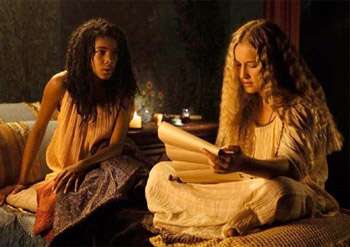
"Salve! My name is Flavia Gemina, daughter of Marcus Flavius Geminus, sea captain. I love solving mysteries. It's my favorite thing to do in the world. Why? Because I hate injustice. (And I hate not knowing things!). I call myself a detectrix, which means a female person who uncovers the truth. Some people in Ostia disapprove of me. They say a proper Roman girl of the equestrian class should stay inside and spin wool and not run about claiming to solve mysteries. But what is more important? Wool? Or the Truth?'" - Flavia, in the introduction to The Roman Mysteries Treasury.
Tropes:
- Bookworm
- Brainy Brunette - Inverted. Flavia has the personality and smarts of a Brainy Brunette, but she is actually blond.
- Chaotic Good - See here. Flavia is motivated by a desire for justice and helping people but has no problems disobeying her father other otherwise breaking rules when it would advance an investigation. She also tends to skirt the edge of what is considered acceptable behavior for a girl of a her social class.
- The Exotic Detective - Flavia is exotic in that she is a Kid Detective and an ancient Roman.
- The Hero
- Meaningful Name - Flavia means "fair haired" in Latin.
- Missing Mom - As a result of Death by Childbirth
- Plucky Girl
- Sherlock Scan
- Tomboy
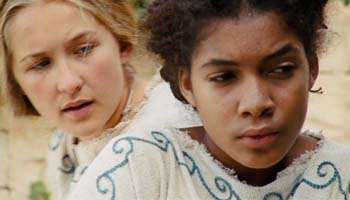
Nubia Original Name - Shepenwepet, daughter of Nastasen of the Leopard Clan
Actor: Rebekah Brookes-Murrell
"We are marched for a very long way. I do not remember those days and nights very well, I am so full of misery. My feet are blister and my throat dry. On that journey many die and are left beside the road for jackals and vultures. My mother and baby sister are among them. I cry and scream and try to stay with them, but the chain is till around by neck and they force me to walking on... You would think that losing everything I do not want to live, but now I am wanting to live more than ever." - Nubia in The Roman Mysteries Treasury.
Tropes:
- Dark and Troubled Past - A raid by slavers killed most of her family, and she was enslaved and brought to Ostia under less than ideal conditions. She still has nightmares at times.
- Druid/Bard - The series doesn't really use fantasy character classes, but Nubia has a rapport with animals and a talent for music that makes her resemble the druid and the bard in some ways.
- Friend to All Living Things
- The Heart
- Made a Slave
- Meaningful Rename - Nubia is really the name that was given to Shepenwepet when she is made a slave. When she is freed, she decides to keep the name, saying "Nubia can be my new name for my new life."
- Naked on Arrival - In the book, but not in the TV series seeing how it is a kids show and the character is played by a child actor...
- Sidekick - To Flavia
Jonathan ben Mordecai
Actor: Eli Machover
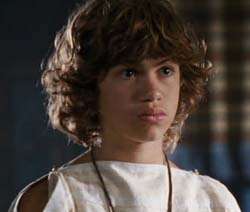
"I was born in Jerusalem about a year and a half before Titus marched on it with four legions. He plundered our Holy Temple, destroyed Jerusalem and either killed or enslaved its inhabitants. My father Mordecai and my older sister Miriam and I got out in time. But my mother was left behind. So I grew up without her. Over the centuries we Jews have suffered persecution from almost everybody, especially the Romans. My family also follows The Way, a new sect whose believers are persecuted by Jews. So we are the most persecuted of the persecuted." - Jonathan, in The Roman Mysteries Treasury.
Tropes:
- The Archer - Jonathan uses both slings and a bow to hunt game.
- Guilt Complex
- Heroic BSOD - Jonathan experiences this at the end of The Enemies of Jupiter when he blames himself for a massive fire that killed thousands of people. It results in examples of Hurting Hero, It's All My Fault, and Survivor Guilt. For a time, he also adopts an alter ego called Ira (meaning wrath) that almost results in Becoming the Mask. When his friends first try to shake him out of it, he expresses a That Man Is Dead attitude toward his real name and identity. His new identity includes some of the elements of Madden Into Misanthropy and something that may even be mild form of Split Personality.
- Heroic Self-Deprecation - Jonathan has a tendency towards pessimism and poor self esteem
- Hurting Hero - Begining with The Assassins of Rome and increasing in The Enemies of Jupiter.
- Manly Men Can Hunt - Jonathan's favorite activity is hunting, and he does pretty well at it.
- Missing Mom - It becomes the main plot point of The Assassins of Rome and The Enemies of Jupiter.
- Ranger - The series doesn't really use fantasy character classes, but if it did Jonathan would be a ranger, as he is skilled with ranged weapons, learns some sword fighting skills, and his favorite activity is hunting.
- Plucky Comic Relief - Only to a moderate degree. He is good at telling jokes and making people laugh, however he can be serious when need be and unlike many characters labeled comic relief, he is not in anyway a looser, incompetent, bumbling or otherwise a Butt Monkey.
- Prophetic Dreams
- Took a Level in Badass - The effect of going through Gladiator School
- Twofer Token Minority - Jonathan in his family are Jewish and Christian. Of course, being a Christian may not seem to be a minority thing to most modern Anglophonic readers, but they are minorities in pagan Rome.
Lupus Original Name - Λύκος
Actor: Harry Stott
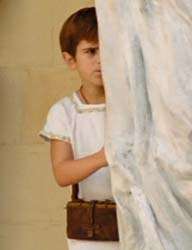
"When I was six years old, a terrible thing happened... After that terrible thing, I did not trust anyone. Anger snarled inside me like a wild dog or a wolf. Like an animal, I made my home in the tombs outside of Ostia. Sometimes I begged. Sometimes I stole... I like drawing and I like spying on people... I am very clever and determined. I'm not bragging. It's the truth." - Lupus, in The Roman Mysteries Treasury
Tropes:
- Artful Dodger - Lupus's life as a beggar boy and innate intelligence makes him sneaky and street smart.
- Dark and Troubled Past - See the quote above.
- Don't You Dare Pity Me!
- Drives Like Crazy
- Hair-Trigger Temper - Lupus looses his temper easily, especially when people ask him about his past or mention his missing tongue.
- Meaningful Name - Lupus, the name of the wild character, means wolf.
- Mysterious Past - Lupus's origins and the reason he has no tongue are not revealed until several books into the series.
- Orphan's Ordeal
- Passing the Torch - Lupus and Threptus
- Rags to Riches
- Rogue - The series doesn't really use fantasy character classes, but if it did Lupus would be a rogue, as he is skilled at stealth and spying, and is sometimes a thief.
- Snooping Little Kid - Lupus uses his skills at snooping, sneaking and eavesdropping several times throughout the series.
- The Speechless - His tongue was cut out when he was very young. In the TV version, he had a tongue but was unable to speak because of psychological trauma.
- Street Urchin - Lupus is homeless at the beginning of the series.
- What the Heck, Hero? - Lupus really, really wants Venalicius dead, even it it means attacking him when he's down and out (Felix has to pull him off) or trying to hire an assassin to murder him.
- It makes a lot more sense when you think about the fact that Venalicius cut out Lupus's tongue.
Relatives of the Four Detectives
Marcus Flavius Geminus
Actor: Eoin McCarthy
Flavia's father is a sea captain merchant who uses his ship to conduct trade. He is fairly well off financially, being of the equestrian class and owning his own boat and house, however he is not among the upper crust of Roman society and wouldn't qualify as wealthy. He is a widower and is frequently absent on ocean voyages, leaving Flavia in the care of his slaves Alma and Caudex. He is unusually liberal for his time period in that he allows his daughter to be educated and gives her a great deal of freedom. This fact meets with the disapproval of some of the other Romans, including his own patron.
Tropes:
- The Captain - He is a literal captain of a ship.
- Different As Night and Day - Not quite so extreme, however Marcus chose the adventure of being a sailor while while his twin brother chose being a farmer.
- Intrepid Merchant - He is a merchant seaman sailing around the Mediterranean Sea to buy and sell goods.
- Meaningful Name - Geminus means twin, which he is.
- Parental Abandonment - A mild example of this in that he is frequently away on buisness. This is not because he is a neglectful or uncaring father but simply because of the nature of his job.
- Team Dad - He is the literal dad to Flavia, and together with Mordecai performs the role of father figure in the stories.
Gaius Flavius Geminus
Actor: Eoin McCarthy
Gaius is Flavia's uncle and twin brother to Marcus. He first appears in The Secrets of Vesuvius, as the owner of a prosperous farm near Pompeii. He also marries Miriam, Jonanthan's sister.
Tropes:
- Country Mouse
- Different As Night and Day - Not quite so extreme, however Gaius chose to be a farmer and his brother chose to adventure of sailing.
- Meaningful Name - Geminus means twin, which he is.
Mordecai ben Ezrah
Actor: Stephen Mapes
The father of Jonathan and Miriam, Mordecai is a Jewish doctor. He married Susannah bat Jonah, the daughter of a Jewish priest, and had two children with her. He also converted to Christianity, which invoked the displeasure of many of his fellow Jews, including his wife's relatives. His lost his wife during the Siege of Jerusalem. He was able to escape with with his son and daughter, and he moved around until he ended up living in Ostia. Mordecai starts out as a mentor and moral guide to the children, though as the series progresses he becomes a more complex and imperfect character.
Tropes:
- All There in the Manual - The Roman Mysteries Treasury contains Backstory that never makes it into the novels.
- Team Dad - He is the literal dad to Jonathan and Miriam and together with Marcus performs the role of father figure in the stories.
- The Medic - He is a doctor, and a very capable one by the standards of the day.
- The Mentor
- Twofer Token Minority - Christian and Jewish, living in a pagan Roman town.
Miriam bat Mordecai
Actor: Natasha Barrero
Miriam is the older sister to Jonathan. She is described as being so good looking that she is always turning heads and once caused an accident because people were looking at her instead of paying attention to what they were doing. She performs many of the traditionally female domestic duties in her household, such as cooking. She generally does to her household duties instead of getting involved in the mystery solving adventures of Tomboy Flavia, her brother Jonathan, and their friends.
Tropes:
- Death by Childbirth - Played straight
- Feminine Women Can Cook
- Matzo Fever - To just about every man she meets that's not related to her.
- Missing Mom
- So Beautiful It's a Curse - She can't stand having men always staring at her.
- Twofer Token Minority - Christian and Jewish, living in a pagan Roman town.
- Unwanted Harem - She has men literally fighting over her, much to her distress.
Other Major Recurring Characters
Alma
Actor: Sara Harris Davies
Alma is one of two slaves in the Flavia's family. She started out as Flavia's nurse and got promoted too cook when the old cook died. She has strong maternal feelings towards Flavia, which extends toward her friends. When she appears in the story she is normally doing household work, fussing over the children, or serving one of her excelent meals. She would qualify as an Apron Maiden except that she is a softhearted slave and Flavia can generally order or manipulate her to do whatever Flavia wants. Alma is the only one that is allowed to call Lupus "Wolfie."
Tropes:
- All There in the Manual - The novels say very little about her background, but The Roman Mysteries Treasury gives much more information about her, told from her own perspective.
- Feminine Women Can Cook - Alma is a Supreme Chef.
- Gossipy Hens - Alma and the other women living on the street all exchange information over at the water fountain. This isn't shown on screen but information she gathers is sometimes used by the Four Detectives during their investigations.
- Happiness in Slavery - Alma is one of the closest examples to this trope being played straight. She is appreciated and well treated by her master and loved almost as a mother by Flavia. She genuinely loves Flavia, Nubia and (in a platonic familial way) Marcus. However, her first mistress treated her poorly.
- Made a Slave - She was a slave since shortly after birth, long before the series takes place. See the next trope.
- Parental Abandonment - Alma was found abandoned as a baby in amidst the tombs on the Via Appia outside of Rome. It was a common practice in Classical times to abandoned unwanted children in a place where they might be found by others and made a slave or adopted by families with no children. It was sort of like the Door Step Baby trope, but unlike the Door Step Baby the child isn't left in a place it is sure to be found immediately, and there is an acceptance of the possibility that the child might die of exposure. The premise was that if the child did die, it was the gods that killed it, not the parent.
- Team Mom - Since all the Four Detective are suffering from Missing Mom Syndrome, Alma does much of the mothering for them, but most especially for Flavia.
Aristo
Actor: Christopher Harper
Aristo is a tutor to Flavia and latter all of the four detectives. He is a young Greek man from the city of Corinth. His looks are frequently compared to the god Apollo, and like Apollo his is a skilled musician.
Tropes:
- The Ace - He borders on this, and certainly all the females around (including the main two female characters) seem to think of him as one.
- The Charmer - He has stunning good looks and a skill at music that has resulted in in collecting a large number of Fan Girls, almost but not quite to the point of a Groupie Brigade. Unlike the Chick Magnet, he is most certainly not an innocent who is unaware of his effect on woman, and unlike the Casanova he couldn't be described as a sexual predator. Because this series is for children, it is left vague as to just how far he does go with women. However he does state that he is tired of shallow love interests, and the first woman he first truly falls in love with does not return his affection but marries another.
- Hot Teacher
- Manly Men Can Hunt - Aristo is frequently out hunting with his friend Lysander.
- The Mentor - Of the Cool Teacher variant
- Gentleman and a Scholar
Marcus Artorius Bato
Actor: Tom Harper
Bato is a city magistrate for Ostia and the most frequent face the law in Ostia. As a magistrate, part of his duty is to enforce law and investigate crimes, however in many ways he's more a politician than a cop. Bato is ambitious to a fault and conscious of his socially superior position in relationship to the Four Detectives. He seems to regard the Four Detectives as troublesome kids, but is willing to work with them to arrest the criminals that the Four Detectives identify.
Tropes:
- Police Are Useless - Not entirely useless, but he hardly ever seems to be able to identify the villain without the help of a bunch of children.
- Reasonable Authority Figure when he isn't being a Corrupt Politician - He is usually on the side of the Four Detectives but not always.
- Unreliable Narrator - One of the short stories is told in form of a letter written by him, and it is obvious that he is putting a slant on the story to try to make himself look better.
Caudex
Actor: Jamie Baughan
The door slave of the Geminus household, Caudex is a strong but gentle slave that sometimes acts as a bodyguard for Flavia and her friends. In The Gladiators from Capua it was revealed that he is from Britania and was enslaved during the Roman conquest of Britain. He was originally trained to be a gladiator be refused to kill.
Tropes:
- The Big Guy
- Gentle Giant
- Made a Slave
- Meaningful Name - His name means "Blockhead" in Latin which is not any more complimentary than it is in English.
Gaius Plinius Secundus
Actor: Simon Callow
Pliny The Elder in one of the several Real Life historical characters in the book, and the first that the main characters meet. Pliny the Elder is one of most famous Roman Authors. He was a naturalist as well as a well connected and high ranking military commander. He appears in The Secrets of Vesuvius and his writings are referenced throughout the series.
Tropes:
- Bookworm - He is an author and a scholar. Not only does he have a large book collection, but he also keeps wax tablets with him at all times to take notes. He even dictates notes while taking a bath.
- Gentleman and a Scholar
- Officer and a Gentleman - He is a praefectus classis (translated to "admiral" in the books) of the Roman fleet.
- Omnidisciplinary Scientist - A Real Life example, though many of the scientific claims have since been demonstrated to be less than reliable.
- Renaissance Man
Publius Pollius Felix
Actor: Tom Mannion
Felix is Uncle Gauis's patron and a very wealthy and influential individual. He's also friends to Emperor Titus. Some characters say he is the second most powerful person in Italy after The Emperor. Others say he is the most powerful person in Rome.
Tropes:
- The Beautiful Elite - He and his family are rich, charismatic, powerful upper class Romans.
- Big Fancy House - The Villa Limona
- Conspicuous Consumption - Lemons are very rare and exensive in Rome. He has a lemon tree of his own so he uses lemon juice for everything. He also gives away priceless antiques to children.
- Casanova
- Drives Like Crazy - He drives recklessly fast, in part to show off his enthusiasm for living in the moment, and in part to test the courage of his passengers.
- Historical Domain Character - Only partially. There was a rich patron named Pollius Felix that may have lived in the same place as the book character, but historians don't really know much about him.
- The Mafia - Well, technically this is set before the modern Mafia, but this does take place in Italy and it is implied that he may be involved in shady dealings.
- "Most of the crime in this whole area... can somehow or other be linked back to him. They call him the Patron."
- Mooks - Felix has a number of men working for him that are officially clients but Pulchra calls soldiers. It is strongly implied that he had his bodyguard kill someone in one of the books
- Of course, he also is friends to The Emperor and acts as Titus's agent in distributing disaster relief. He is patron to Flavia's uncle, who is not a criminal. So is he a criminal mastermind or an okay guy with a bad rep? It isn't so clear.
- The Latin word patronus later became the Italian word padrino, the expression used to describe the godfather in the Mafia. Many have compared the Roman patron-client system to the workings of the modern Italian mafia.
- Maid Corps - Not quite, but he is well supplied with slaves, all dressed in lemon-yellow, and even his kids each have personal slaves. Many of the slaves provide Felix with personal attention.
- Red Oni - Personality wise, though there is no color association.
- Travel Cool - In the TV series he drives a chariot. In the books he drives a more historically plausible example of a Roman carriage.
Polla Felicia Pulchra
Actor: Millie Binks
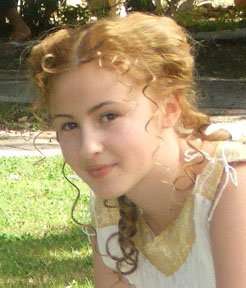
The daughter of Felix, Pulchra is introduced as the quintessential spoiled brat. However, because of the events of The Pirates Of Pompeii, her spoiled brat tendencies soften a bit and she becomes a friend to Flavia.
Tropes:
- Brainless Beauty - Not quite stupid, but she certainly places a higher value on looks than learning.
- The Beautiful Elite - She clearly thinks of herself as being an example.
- Daddy's Girl
- Lonely Rich Kid
- Meaningful Name - Actually nickname, because Roman girls didn't have personal names. Pulchra is Latin for beautiful, and she is described as good looking and more than a bit vain.
- Spoiled Brat - She's not a brat to her parents, but treats slaves cruelly and acts snobbish toward Flavia.
Venalicius
Actor: Richard Ridings
Venalicius is the slave trader that sold Nubia to Flavia.
Tropes:
- Criminal - Slave trading is perfectly legal in Rome, but he also kidnaps freeborn children to sell as slave.
- Lukos, I am your uncle - In an interesting twist of the trope, Lupus knew about the relationship all along, as does Venalicius. It is just the rest of the characters and the audience that are kept in the dark
- Heel Face Turn - Venalicius repents of his evil ways and tries to become The Atoner to those that he hurt. Unfortuantly Redemption Equals Death and he dies very painfully in one of the most effective Tear Jerker scenes of the series. Fortuantly for the plot, it is also revealed that he is not the Big Bad but that in fact he is just The Dragon for the Big Bad, allowing the characters to go after yet more villains.
- Made a Slave - Inverted. He isn't made a slave. He's the guy making everyone else a slave.
- Villian
- Red Right Hand - Venalicius is ugly, has rotten teeth and has a blind eye. This is part of his Freudian Excuse.
Titus Flavius Domitianus
Actor: Duncan Duff
Domitian is a Real Life character who is the younger brother of Emperor Titus. He is featured in The Assassins of Rome, The Gladiators from Capua and plays a role in all of the final four books.
Tropes:
- The Caligula - As a matter of fact, his name was already listed as a Real Life example of The Caligula before this page was ever written. However, in story, examples include not only the historical anecdotes mentioned on that page, but also arranging for children to be eaten by crocodiles as part of the entertainment in the Flavian Ampitheatre and acting as if he were about to molest Nubia. Still, he isn't quite as bad as the actual Caligula, or even Nero.
- Historical Domain Character
- The Emperor - Domitian becomes the new Emperor of Rome by the end of The Man From Pomegranate Street.
- The Unfavorite - Flauccus suggest that Dormition was the Unfavorite of his father and is also trying to gain his brother's approval, which might be his Freudian Excuse for much of his poor behavior.
Titus Flavius Josephus
Actor: Andrew Scarborough
Josephus was a Real Life Jewish historian who is now remembered as one of the most important historical sources for 1st century Jewish history. He is a controversial figure, in that he accepted patronage from the Flavian emperors, who were hated by Jews for their role in suppressing the Jewish Revolt and destroying the Jewish Temple. He accepted Roman citizenship and changed his name from Yosef Ben Matityahu to Titus Flavius Josephus. In The Roman Mysteries, he appears in The Assassins of Rome and The Enemies of Jupiter. He is a member of Titus's court and completely loyal to Titus, even to the point of exposing Jonathan and his uncle as they try to infiltrate the imperial palace however he is is not depicted as a bad guy. In The Enemies of Jupiter he helps the Four Detectives in one of their investigations.
Tropes:
- Bookworm - Josephus was a scholar and an author.
- Historical Domain Character
- The Quisling - Many, especially Jews, think of him this way, however the books don't really dwell on this or depict him as an evil person.
Titus Flavius Vespasianus
Actor: Nicholas Farrell
Emperor Titus is a historical character who reigned as the emperor of Rome. His reign provides the time frame of the series. He off screen assumption of power (June, 79 AD) is mentioned in the first book and his death (September 81 AD) provides the plot of the final book. Titus appears briefly in The Pirates of Pompeii and plays a major role in The Assassins of Rome, The Enemies of Jupiter, The Gladiators from Capua. Titus is also mentioned in subsequent stories, and plays an important but off screen role in the final four books.
Tropes:
- The Atoner - Titus says at one point that he is trying to atone for the destruction of Jerusalem.
- The Emperor - Of Rome
- Historical Domain Character
- Lawful Neutral - Titus is honorable by Roman standards but still engages in some behavior that most modern readers would consider reprehensible, to include his sponsoring of Gladiator Games.